高教版职高英语1(基础模块)Unit_1课件.
中职英语基础模块unit 1PPT课件

第14页/共44页
Dialogue
(R=Ralph, J=Julie) R: Hi, Julie! I’ve heard that you are good at English. So please do me a favor, will you? J: Of course. What’s the matter? R: I am poor in English learning and I don’t know how to improve it. Could you give me some advice? J: Sure. Let’s start from pronunciation. How about your pronunciation? R: It’s too bad and is really my big headache. I can’t make myself understood by foreigners. J : That’s because your pronunciation is not correct. You can listen to some English songs and learn to sing them. It may help a lot. R: That sounds great. I’ll try. Thanks a lot. J : Don’t mention it.
Good cookies could be cooked by a good cook, if a good cook could cook good cookies. I don't know why Joan showed a yellow coat to the goat in the snow. Tom has got a lot of dots on his pocket. If he wants to wash off the dots, he will use a pot of hot water.
职高英语基础模块上Unit1课件

6. Our classroom building is ____ the dinninghall.
A. next to B. next on C. at
D. to
7. There ____ a dinning room and two bedrooms in my house.
A. be
B. is
如: _H_o_w__c_l_e_v_e_r _a_g_i_rl_s_h_e__is_!_ 她是多聪明的孩子! 注意:what 与how引导的感叹句可以转换。 如: What a beautiful garden it is! →
_H__o_w__b_e_au_t_i_fu_l_t_h_e_g_a_r_d_e_n_i_s_! 多漂亮的花园啊!
5. 感叹句 ㈠ What 引导的感叹句 ①What +a/an + adj+单数名词+(主语+谓语)!
如: __W__ha_t_a_c_l_ev_e_r_b_o_y_h_e_i_s!_ 他是多聪明的孩子!
②What +adj+可数名词复数+(主语+谓语)! 如: __W_h_a_t _w_o_n_d_er_f_ul_i_d_e_as_(_w_e_h_a_v_e_)!_ 我们的主意真棒!
3. a lot of=lots of +可数名词或不可数名词 “很多,大量的”。如:
_Y_o_u__ca_n_s_e_e_a_l_o_t _of__ca_r_s _in__th_e_s_tr_e_et_._ 在街上,你能见到许多汽车。 4. next to “紧挨着”。如:
__T_h_e_te_a_c_h_er_’s__ro_o_m__is_n_e_x_t _to__ou_r_c_l_as_s_ro_o_m_._ 教师办公室紧挨着我们的教室。
高教版职高英语1基础模块Unit1课件
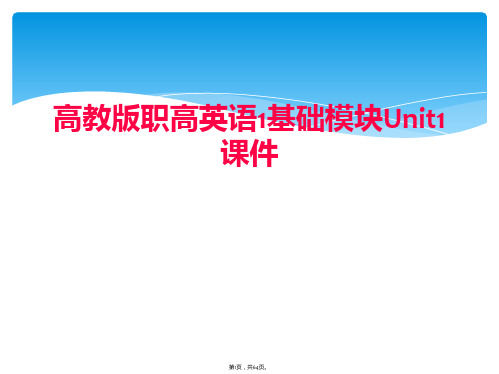
Activity 12
Talk and complete. 用下面语句询问5个以上同学的个人信息,填写表格。
What’s your name?
What’s your first name / last name? Where are you from?
My name’s … / I’m … My first name / last name is … I’m from …
第8页,共64页。
2.任何时候都可以用,但比较见外
• How are you?你好吗?
3.适用于第一次见面
Nice to meet you. 很高兴见到你。 How do you do. 你好!(比较正式,现在已较少使
用) 适用于曾经见过一面,但不太熟的人
Nice to see you again. 很高兴再次见到你。
• Jane: Sure!
• 2. Jane: Good morning, Xiaobin. How are you today?
• Zhang Xiaobin: Pretty good, thanks. How about you?
第19页,共64页。
• 3. Jane: How are you doing?
66435160
Wang Li
25
a. telephone number
b. name
c. age
No. 3 Hexi Street, Tianjin
d. address
e. e-mail address
Manager f. job
第37页,共64页。
Activity 14
Read and check. 读以下名片,核对活动13的答案。
中职英语基础模块上册unit1PPT课件

Kissing hands
吻手礼:吻手礼源于古代维京人用手向其日耳曼君 主递礼物的风俗,流行于欧美上层社会,是一种仅对贵 族已婚妇女实施的礼节。吻手礼一般在室内举行,并且 仅限于手腕以下部位,一般是指背。
cross one's
hands 双手合十:
这种礼仪多见于 信奉佛教的国家,比如说泰国。 泰国人见面时往往低头问候, 并将双手合十于胸前。小辈见 长辈双手举到前额高度,平辈 到鼻子高度,而长辈还礼则只 需到胸前即可。另外,泰国认 为头部是神圣的,不能随意摸 别人的头。
你呢
I'm fine,too.Tha
nk you! 我也是,谢谢
LOREM IPSUM DOLOR
Nice to meet you! 很高兴见到你 Nice to meet you,too! 也很高兴见到你
• Notes:
•
• 1. Introductions are important because a proper introduction will leave a good first impression upon others.
bisous
贴面礼: 在阿拉伯国家,两个老朋友相见 不仅仅会握手和拥抱, 还会行贴面礼。行礼时,用右手 扶着对方的左肩,左手搂住对方 的腰, 左——右——左贴面三次。如果 两人关系亲密,还会在贴面的同 时发出亲吻的声音。
rub noses
碰鼻礼:新西兰的原住民 毛利人中还保留着一种古老 的见面礼仪,即碰鼻礼。毛 利主人在初次见面时必须与 客人鼻尖对鼻尖连碰两三次, 碰的次数越多、时间越长, 则说明客人 越受他们尊敬。
New words and expressions
❖welcome
《英语1》(基础模块 高教版)第一单元的第三课时

Book1 Unit 1 Nice to meet you!(第三课时教学设计)一、教材分析1.教学内容本课时系教材《英语1》(基础模块高教版)第一单元的第三课时,包括language in use和vocabulary consolidation两部分,具体内容为:be动词的用法和名片各栏目词汇的表达,职业词汇收集。
2.教学重点、难点⑴教学重点be动词的用法和主题词汇的积累,未来职业的描述⑵教学难点主题词汇的积累二、教学目标1.知识目标⑴掌握与名片设计相关的主题词汇,如name, first name; last name; name card; telephone number; age; address; e-mail address; job (engineer; manager; secretary; teacher; student; doctor; nurse; singer; fans); position(boss)。
⑵掌握be动词的用法。
(3)能描述自己或他人的职业。
2.能力目标⑴学生能清晰表达名片各栏目。
⑵学生能熟练掌握职业词汇以及be动词的用法。
3.情感目标学生清楚自己的职业梦想,建立初步的就业意识。
三、教学步骤(英文)Step One Lead-in (10m)1. Have a comment on the students’ name cards. Pass the cards around the class. (设计意图:教师及时对学生的作业作出评价,对优秀作业的集体肯定,可以促使学生更积极主动地做作业。
)2. Ask the students to present and talk about the name cards they have collected in groups. Use the following sentence patterns.His name is …He is from …He is a …His telephone number is …(设计意图:读懂名片信息,掌握动词be的用法之一:用is的情况。
高教版职高英语(基础模块)Unit课件

complete.
Reading Expansion
Reading related materials
Recommend or provide additional readings that are related to the topic or theme covered in the original passage, to encourage further exploration and enhance understanding.
Provide students with a passage with some missing information, and ask them to fill in the blanks with the correct information they have heard.
Listening Expansion
教授学生基本的救生技能,如 如何正确使用救生器材、如何 进行心肺复苏等。
Grammar application
01
通过实际语境和例句,让学生理解语法点在日常生 活和工作中的应用。
02
鼓励学生运用所学的语法知识进行口头和书面表达 ,提高语言输出的准确性和流畅性。
03
通过写作练习和翻译训练,让学生在实际操作中巩 固和拓展语法知识。
Higher Education Edition Vocational High School En
目
CONTENCT
录
• Unit Overview • Vocabulary learning • Grammar parsing • Textual elaboration • Listening training • reading comprehension • Writing guidance • Oral Practice
高教版职高英语基础模块课件演示文稿

Tick the activities you did before.
stomachache cough
toothache headache
fever back pain
_s_t_o_m__a_c_h_a_ch__e___
第7页,共69页。
Tick the activities you did before.
1. Bob: a terrible toothache, a week
Doctor not serious, brush teeth, eat less sweets, take the : medicine twice a day
2. Eva: cough, feel cold, one day
高教版职高英语基础模块课件 演示文稿
第1页,共69页。
(优选)高教版职高英语基础 模块课件.
第2页,共69页。
第3页,共69页。
第4页,共69页。
Find the right words for the pictures.
stomachache cough
toothache headache
第25页,共69页。
Read and fill in the forms.
The last was Henry. He hurt his left foot during a football match. Dr. Smith asked
him to lie down and put an ice bag on his foot. Henry felt much better. Dr. Smith smiled, “OK, go home and use ice on your foot for 5 minutes each hour for the first 2 days. Stay in bed for a week.”
高教版英语1(高职高专版)(第三版)课件unit 1
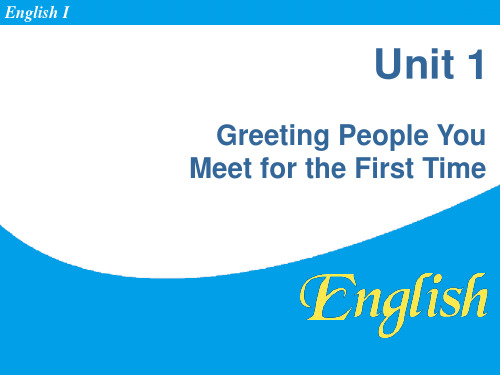
Unit 1 Greeting People You Meet for the First Time
Aims and Requirements Language Focus
Focal Function and Patterns
3) Hi! How are you? Hello! How are things with you? Hey! How are you doing?
English I
Unit 1
Greeting People You Meet for the First Time
高教版中职英语基础模块一 Unit1 Reading and Writing 精美课件

Read and write.
再读家庭简介,进一步描述两个家庭的特点。
Anna Sห้องสมุดไป่ตู้ith’s Family Individual
Yuchen’s family pay more attention to _i_n_d_i_v_i_d_u_a_ls_.____ For example, they __d_o_n_’_t _li_v_e__to_g__et_h_e_r_w__i_th__g_r_a_n_d_m__a_.__ P__a_r_e_n_t_s_g__o_j_o_g__g_i_n_g__e_v_e_r_y__e_v_e_n__in__g_._T__h_e_y__d_o_n__’t__s_ta_y__w__i_th t_h_e__c_h_i_l_d_r_e_n_.__________________________________________
_S_t_u_d_e_n_t_s_m__u_st__p_r_ep__a_re__f_o_r_c_o_ll_e_g_e_e_n_t_r_a_n_c_e_e_x_a_m__in_a_t_i_o_n_.
Anna Smith’s Family
I live with my mom, my dad, my twin sister Emma and Buddy — my puppy.
2) Children watch TV with grandparents on the weekend. 与…玩耍
3) Children play with their little dog after school.
在周末
4) Father buys a birthday gift for grandmother.
高教版中职英语(基础模块 预备级)Uint 1《Hello》ppt课件

Yukimistə / Miss /mis/ Mrs. /'misiz/ Ms. /miz/
Dr. /dɔktə /
Used for
Single and married men 未婚或已婚男士 Single women 未婚女士
INTROCING OTHERS
POSSIBLE RESPONSES
This is xxx. Have you met my friend xxx? I don’t think you’ve met xxx before.
Nice to meet you. Pleased to meet you. My pleasure.
Sue:
It’s Sue. S-u-e Sue.
Billy: Sue. Got it.
INTRODUCING YOURSELF
Hello. My name is xxx. Hello, I’m xxx.
POSSIBLE RESPONSES
Hello, I’m xxx. Nice/Pleased to meet you. I’m xxx.
Listening and Speaking
What is their relationship?
Sandy &Sue
( ) brother and sister
(√ ) classmates
( ) friends
Billy: Hi, I’m Billy. You’re a new student, aren’t you?
编后语
老师上课都有一定的思路,抓住老师的思路就能取得良好的学习效果。在上一小节中已经提及听课中要跟随老师的思路,这里再进一步论述听课时如何 抓住老师的思路。
中职高教版英语1基础模块
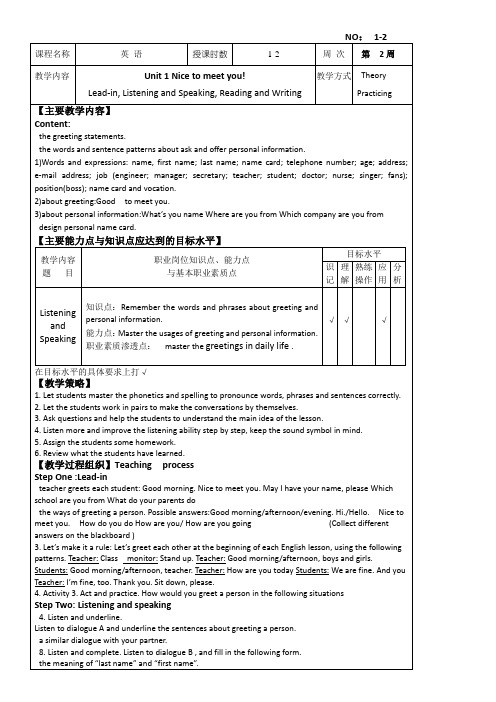
9. Read and underline. Practice the dialogue with your partner and underline the sentences aboutasking one’s personal information.
some students to design their name cards on the blackboard. Make some comments.
each student or each group a name card. Ask the students to talk about the information in the name card.
each student or each group a name card. Ask the students to talk about the information in the name card.
【作业及思考】Step Four:Homework
1. Practice dialogue B with your classmate after class.2. Make a similar dialogue, talking about personal information.3. Make an introduction of your classmate.4. Copykey vocabularyfive times in English ang one time in English.a special name card for yourself.
NO:1-2
课程名称
高教社高职高专英语1 Book1_Unit1(课堂PPT)
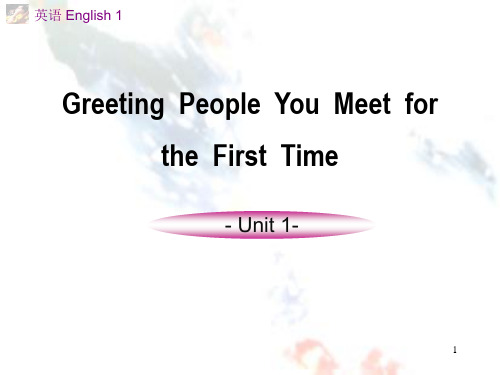
2. Where is the professor from?
S__h_e__i_s__f__r_o_m___t_h_e___U_n__it_e__d__S__t_a_tes of America.
20
英语 English 1
3. Why do we say Professor Waters is an expert in English teaching?
13
英语 English 1
Before Reading Detailed Reading After Reading Quit
She is a very good teacher and she is really an expert in English teaching and learning. She is the author of a dozen books in this field. So, it is a pleasure for us to have her as our English teacher here. Now, let’s welcome her to say a few words to us! (Clapping)
5
英语 English 1
Before Reading Detailed Reading After Reading Quit
How do you do?
(Li Hong is a receptionist. She works at a Guest House of a Technical School. Lizzy is an overseas student. She is from South Africa. Li Hong now is meeting her at the airport.)
高教社中职英语基础模块1Unit
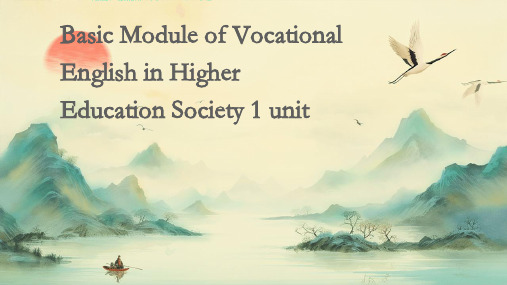
Student feedback and suggestions
Student Feedback
Most students are satisfied with the course content and teaching methods. They appreciate the lively class atmosphere and interactive teaching style.
心。
04
Teaching evaluation
Formative evaluation
目的
及时提供反馈,帮助学生了解 自己的学习状况,调整学习策
略。
方法
观察、口头反馈、作业批改、 小组讨论等。
优点
及时、针对性强,有助于学生 及时纠正错误。
缺点
主观性强,缺乏客观标准,难 以量化评估。
Summative evaluation
02
详细描述
通过阅读职业英语相关文章,提高学生的阅 读理解能力,培养其快速获取信息、分析和 解决问题的能力。
04
详细描述
分析文章的结构、逻辑和写作技巧, 帮助学生了解不同文体的特点,提高 其写作水平。
06
详细描述
通过段落大意的概括练习,培养学生的归纳总 结能力,提高其阅读理解和信息筛选能力。
Listening training
02
Teaching content
Vocabulary learning
在此添加您的文本17字
总结词:掌握基础词汇
在此添加您的文本16字
详细描述:学生应掌握与职业英语相关的常用词汇,包括 专业术语、行业常用表达等,为后续的阅读、写作和交流 打下基础。
高教职高英语基础模块课件

membership? B: Where can I get the schedule?
dancing club chess club
health club
football club
4)
Singing Club
Activity 8
Listen and complete. 再听录音,补全句子。
1) The membership of the Science Club is _4_0__y_u_a_n_a__te_r_m___ for experiments. 2) Zhang Wei can go to _t_h_e_c_lu__b_w_e_b_s_i_te__ to get the schedule of the Science
询和交流。 读 —— 学生能够读懂有关介绍俱乐部活动的宣传海报。 写 —— 学生能够读写加入俱乐部的相关信息并写出加入的理由。 学 习 策 略: 学生能够运用寻求建议、列表比较、综合分析等多种策略筹建俱乐部并招聘会员。 文 化 意 识: 学生掌握英语中参加社会活动时的程序、表达习惯和相关礼仪。 情 感 态 度: 学生能够在具体语境下对俱乐部相关事宜进行评价和取舍。 单 元 任 务: 学生能够运用所学语言筹建俱乐部并招募新成员。小组合作组建一个俱乐部,确定俱乐部的名
Club. 3) Wang Yang is a __m_e_m__b_e_r_______ of the English Club.
Activity 9
Read and underline. 阅读对话,用下画线标出询问俱乐部 信息的语句。
At the entrance to the English Club. Ben: Hi, Wang Yang! Welcome to the English Club!
高教社中职英语基础模块1unit课件

情境活动:设计各种情境活 动,让学生在活动中学习和
运用知识
情境评价:通过情境评价, 了解学生的学习情况和效果
任务驱动
任务驱动教学法: 以任务为驱动, 引导学生主动学 习
任务设计:设计 具有挑战性和趣 味性的任务,激 发学生的学习兴 趣
任务实施:引导 学生完成任务, 提高学生的实践 能力和创新能力
任务评价:对学 生完成任务的过 程和结果进行评 价,促进学生自 我反思和自我提 升
感谢您的观看
汇报人:
教师评价与反馈
评价标准:根据学生的学习表现、 作业完成情况、课堂参与度等方面 进行评价
反馈方式:及时向学生反馈评价结 果,指出优点和不足,提出改进建 议
添加标题
添加标题
添加标题
添加标题
评价方式:采用多种评价方式,如 教师评价、学生自评、同伴互评等
反馈内容:包括学习态度、学习方 法、学习效果等方面的反馈,帮助 学生了解自己的学习情况,提高学 习效果。
教学演示:教师示范讲解,帮助学 生掌握技能
添加标题
添加标题
添加标题
添加标题
教学动画:生动有趣的动画,帮助 学生理解知识点
教学案例:真实案例,帮助学生理 解知识点在实际中的应用
拓展资源
教材配套网站:提 供在线学习资源和 教学辅助工具
网络课程:提供在 线课程和视频教程, 方便学生自主学习
教学软件:提供英 语学习软件,如单 词记忆、听力训练 等
适用人群
中等职业学校学生
英语基础薄弱的学生
希望提高英语水平的学生
英语教师和教学研究人员
课件特点
内容丰富:涵盖中 职英语基础模块1 的所有知识点
形式多样:包括视 频、音频、图片、 文字等多种形式
高教版中职英语基础模块一 Unit1 文化理解和小组活动精美课件

Underline important information about Lu Xun’s three different names in this information board.
在以下简介牌中标出有关鲁迅先生三个不同名字的重要信息。
Lu Xun (鲁迅) was born in September, 1881. His grandfather named him Zhou Zhangshou (周樟寿), which means longevity (长寿). In April, 1898, he became a student in Jiangnan Naval Academy (江南水师学堂). His grandfather’s brother, Zhou Jiaosheng (周椒生), named him Zhou Shuren (周树人). The given name means educating the young. In May, 1918, he published A Madman’s Diary (《狂人日记》) under the now famous pen name Lu Xun. It is said that he chose Lu Xun because Lu is his mother’s family name and Xun means being fast.
Review
live with sb/sth
和某人或某物住在一起
love sb/sth very much 非常爱某人/某物
live in + 地点
居住在某地
be strict with sb
对某人严格
cook /make lunch
高教社中职英语基础模块1Unit ppt课件

ppt课件
3
Lead-in
1
Activity 1
2
Activity 2
ppt课件
4
Activity 1
Read and tick. 读下列单词,选出与餐厅相关的词。
( ) food
( ) menu
( ) juice
( ) ball
( ) teacher
( ) book
( ) chicken
ppt课件
11
Activity 5
Read and underline. 阅读对话,用下画线标出描述餐厅的语句。 Tang Hua: Hi, Sara. Do you want to eat out?
Sara: Yes. Do you like Chinese food or Western food? Tang Hua: I’d like some Western food.
Dialogue B
Would you like to
order?
1
Activity 7
2
Activity 8
3
Activity 9
4
Activity 10
5
Activity 11
6
Activity 12
ppt课件
17
Activity 7
Look and tick. 看图,选出服务员要说的话。
1) The waiter might say: ( ) a. Hello! Nice to see you! ( ) b. Welcome to Meiwei Restaurant!
ppt课件
19
Activity 9
高教版中职英语基础模块一 Unit1 Language Practice精美课件
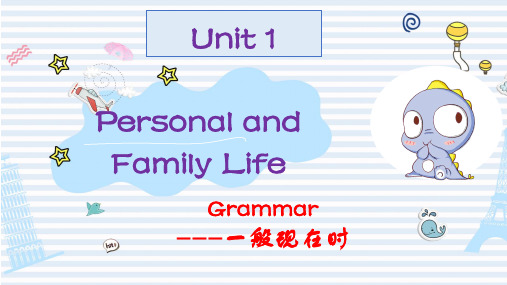
Personal and Family Life
Grammar ---一般现在时
Learning Objectives:
Knowledge objectives To master the basic usage of simple present. Ability objectives To be able to use simple present accurately.
Emotional objectives To cultivate the good learning habit and improve the language ability.
一般现在时
概念
I often eat apples. 我经常吃苹果。
Mike plays basketball every day. Mike 每天打篮球。
练习
2. My father often ______ to work by bus.
A. go B. goes C. went D. is doing
一般现在时 实义动词句式结构
1. 肯定句: 主语 + 实义动词 (do/does) + 其他.
Eg: I play basketball every day. He plays basketball every day.
New Message
Subject: I have a new friend!
Read and choose.
1. I _____ a piano lesson every Sunday afternoon.
A. had B. will have C. has D. have
2. The two boys _____ from Luzhou.
职高英语基础模块上Unit1课件
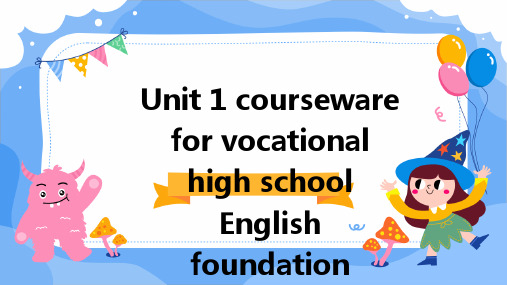
Listening exercises and answer analysis
Exercises should be designed to test students' comprehension of the listening materials rather than their ability to repeat words or phrases.
Students should be taught how to understand different speaking rates and volumes, as well as the use of pauses, emphasis, and intonation.
Students should be taught how to identify different types of English language registers, such as formal and informal language.
• Giving advice and suggestions: This topic helps students learn to give advice and suggestions on various topics, such as healthy living, travel, and study skills. They also learn to use modal verbs, such as "should" and "could," appropriately.
Analysis of Reading Skills
识别并分析文章结构
引导学生识别文章的主题句、段落大 意和整体结构,帮助学生理解文章的 主旨和逻辑关系。
